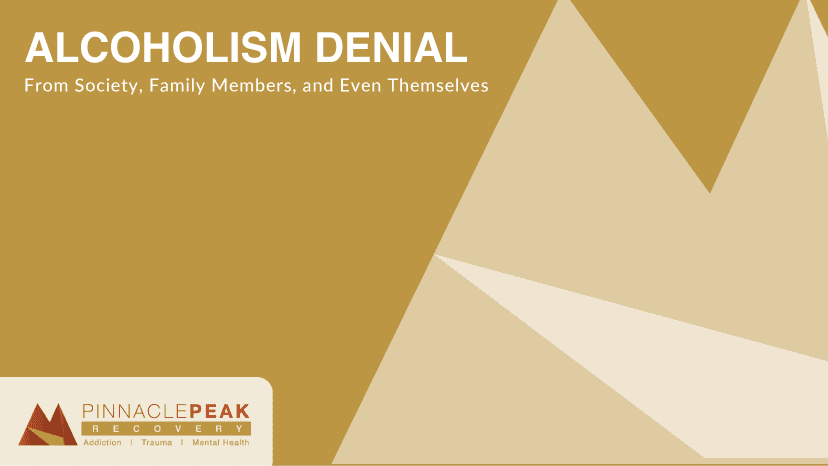You can still remember the first time you had a drink. You were 15 years old, at your first high school party. It was at someone’s house and one of your friends came over holding a beer in their hand, looking at you excitedly. They asked if you wanted to share it and the thrill of trying alcohol helped the both of you finish off the bottle.
Now, years later, you still drink. When your friends come over for a barbeque, you crack open some beers and IPAs. Sometimes when you come home stressed from work, you grab a drink from the fridge to help take the edge off. It makes you feel better.
You don’t think you drink that often, but when your spouse approached you and expressed concern, you were caught off guard. Of course you’re not an alcoholic, how could they think that? You could stop drinking at any time, but why would you? It’s not like you’re broke or you stay out partying all night. Surely they’re just overexaggerating.
Here in Arizona, alcohol consumption isn’t uncommon. In fact, 17% of people over the age of 18 binge drink at least once a month. At what point does alcohol use turn to alcoholism? How could someone be unaware of their own levels of alcohol dependence? Is alcoholism denial really a thing?
Our team at Pinnacle Peak sees all walks of life come through our doors. We’ve heard almost every story you can imagine when it comes to people and their histories with alcohol use. Alcoholism denial is a real thing, and it’s important to talk about why it happens. As a facility dedicated to offering patient-focused care with a family feel, we strive to help our community learn more about alcohol use. By providing educational information we hope to continue to lower the stigma around alcoholism and getting help when you need it most.

What Is Alcoholism Denial and Why Does It Happen?
As you might be able to infer by the name, alcoholism denial is when someone is managing an alcohol use disorder but is either unaware of it or won’t admit it to others. Denial can be internal, where they don’t want to look inward and acknowledge a problem they are experiencing, but it can also be external. When it’s external, they don’t want others to acknowledge their alcoholism. This can happen for a variety of reasons that we will get into in a moment.
How Can Denial Be a Symptom of Alcoholism?
If someone is defensive or is very adamantly denying something, there is a strand of truth in the saying from Shakespeare’s Hamlet, “The lady doth protest too much, methinks.”
When we accuse someone of something and they deny it, there are two reasons why that happens.
- They’re upset you would suggest that, because they didn’t do it.
- It hits close to home and they don’t want you to know the truth.
Unfortunately, depending on the person and their lying capabilities, it’s not always easy to tell which is why. This is why it’s important to consider all angles and look for other evidence whenever you want to approach someone about something serious.
In the case of alcoholism denial, it can be either one, depending on if they’re lying to themselves or you.
The Two Most Common Reasons for Alcoholism Denial
Alcoholism denial doesn’t come out of nowhere. One of the main reasons for denial when it comes to alcoholism is the social stigma and stereotypes of alcoholism. They might think of very specific things, like people who are loud and aggressive or abuse their partners because of alcohol use. They then look at themselves and go, “I don’t do that, therefore I’m not an alcoholic.”
However, alcoholism denial can sometimes come from those around the person managing the alcohol use disorder. Let’s take a closer look at why these both happen.
Using Alcoholism Denial as a Defense Mechanism
As humans, we do a lot of things to try and protect ourselves from harm. This includes emotional harm, too. Alcoholism denial can be a defense mechanism because a person doesn’t want to feel like they’re doing something wrong. They’ll deny it so others don’t have a chance to see them in a negative light, so they don’t have to look inward and question the choices they’ve made throughout their life.
Alcoholism Denial Coming From Loved Ones
When a friend, family member, or other loved one is the person actively denying someone else’s alcohol use disorder, this can stem from many of the same things. Often they don’t want to face the feeling that their loved one might need help or that they might have contributed to their alcohol use. They might be ignoring their internal guilt over any number of things related to their loved one’s alcohol use. Sometimes they want to shelter their loved one from any outside criticism or hurt.
The denial doesn’t come from a place of malice but rather usually from a place of fear.
How to Spot the Signs of Denial in Alcoholism
As mentioned earlier, if you think someone is in denial about their alcoholism, it’s important to assess if they may or may not be managing an alcohol use disorder in the first place.
Here are some common signs of an alcohol use disorder:
- They’ve stopped doing activities they used to love
- Most of their day involves alcohol in some way (thinking about it/drinking it/recovering from it).
- They’ve gotten into multiple unsafe situations because of their drinking.
- They show signs of alcohol withdrawal when not drinking such as tremors, depression, headaches, nausea, clammy skin, mood swings, and more.
- They need to drink more to experience the same effects.
If you’re ever concerned about your loved one, talking with them is the best way to work through these fears. If they’re in denial about their use, however, your approach needs to be a bit different.

The Best Methods for Helping Your Loved One With Alcoholism Denial
As we’ve established, alcoholism denial usually comes from a place of fear, guilt, concern, or a combination of the three. If you want to talk with your loved one about their alcohol use, you need to approach them in a specific way.
Talk to Them Openly and Without Judgment
If you come up to your loved one aggressively or upset in any fashion, this won’t help them open up and listen to what you have to say. Ask them if they can have an open and honest conversation with you. Remind them that you care about them and want to get onto the same page while also expressing your concerns. Be honest with them.
Ask them questions about how they’re feeling and about their thoughts and feelings on the situation. If they open up about why they drink or how they feel about it, don’t judge them. Be prepared to maybe hear dark thoughts or feelings from your loved one, and remind them that these vulnerable admissions don’t change how you care about them. Don’t be afraid to thank them for talking with you openly about this hard topic.
How to Approach the Topic of Recovery for Alcoholics in Denial
Recovery is already a hard topic to approach, even without alcoholism denial. If your loved one is hesitant about rehab, simply start by suggesting the two of you research what it entails, what options they have, and what the pros and cons are.
Don’t be afraid to offer to help. Help can vary from researching facilities to driving them to their first appointment. Even though it may seem overwhelming, recovery is possible. There are options out there that will happily work alongside each client to set a plan that works for their specific needs.
Here at Pinnacle Peak, that’s our goal. We want to help you find a recovery plan that works for you. We’re passionate about our evidence-based practices and always move forward with a patient-focused approach. We know that every person who walks through our doors is unique, which is why we never stick to a one-size-fits-all treatment plan. With our full continuum of alcoholism treatment care, we’ll work together to set you up for long-term success.
Break Through The Barrier Of Alcoholism Denial And Embrace A Healthier Future!
Call Us To Start Your Journey To Sobriety Today.
Whenever you or your loved one is ready to take the step toward recovery, our team here at Pinnacle Peak will be here for you. You can give us a call anytime at (866) 377-4761 to get started, or even just to answer any questions you may have. With our clinical excellence, compassionate care, and family feel – we’re happy to help you on this journey of healing.

